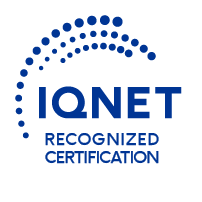FUNDED PROJECT
INAIR - Enhancing AI Skills in European Retail
INAIR - Enhancing AI Skills in European Retail
AI for Retail.
How to make AI a supportive tool in the retail sector?
ARTIFICIAL INTELLIGENCE (AI)
E-LEARNING
RETAIL
The inAIR project stands as a crucial step towards equipping the European retail sector with the necessary AI skills, fostering sustainable business practices, and enhancing overall competitiveness in the digital age.
This aligns with the European Digital Decade's target of having over 75% of European companies adopt AI technologies by 2030.
This aligns with the European Digital Decade's target of having over 75% of European companies adopt AI technologies by 2030.

Focus
UX/UI Design
UX/UI Design
Funding organization
European Union’s Horizon Europe Research and Innovation Programme
Team
Maurizio Mesenzani
Alessandro Pollini
Giordano Manchi
Tania Sabatini
Luca Cavioni
Maurizio Mesenzani
Alessandro Pollini
Giordano Manchi
Tania Sabatini
Luca Cavioni
Partner
Lascò
TEAM4Excellence
University of Warsaw
ITKAM
University of Cyprus
Lascò
TEAM4Excellence
University of Warsaw
ITKAM
University of Cyprus

An E-Learning platform to enhance AI skills for workers in the retail sector.
The adoption rate of key digital technologies, such as Artificial Intelligence, by businesses remains significantly low in the European Union, while the global market of AI in retail is growing at a compound annual growth rate of 35% over the next 5 years.
The goal of the INAIR project is to develop and implement an E-Learning platform that provides tools and courses for workers in the Retail sector to improve their skills in using Artificial Intelligence. To achieve this result, the project is structured around 4 key points:
Research: research to identify multi-level AI skills needs and gaps for MSMEs working in the Retail sector. The research report will collect both the findings and conclusions of the transnational research work, and recommendations and guidelines for designing an AI Core curriculum for MSMEs in Retail. Particularly, through desk research and co-creation workshops with relevant industry experts, the consortium will analyse in the countries involved the gaps in two key areas, such as ESCO’s transversal, information and digital skills needed to adopt AI, and sector-specific technical skills needed to adopt AI.
AI core curiculum: the Curriculum will cover the fundamentals of AI and its applications for greening retailers and supporting them in optimizing resources and processes. Co-created with educators and industry experts, the curriculum will address the transversal, green, information, digital and technical skills needed to adopt AI to make their companies, processes and products more sustainable, following ESCO’s classification. The curriculum will cover a map of relevant web-based AI tools meeting the requirements defined in The Ethics Guidelines for Trustworthy Artificial Intelligence developed by the EC’s High-Level Expert Group on AI. The curriculum will be built on the fractal educational model, and embed modular learning approaches. Proficiency in the different domains will be defined via an AI Skills Assessment Tool, aimed at objectively assessing the knowledge and skills linked to the domain defined in the AI skills needs and gaps analysis.
Open educational resources: Through the Open Educational Resources, the consortium will transform the content outlined in the Learning Blocks into interactive learning resources (e.g., learning modules, interactive tools and simulations, learning games, and quizzes). The OERs will be developed in ENG and each partner’s language and validated with industry experts.
E-Learning environment: yhe Environment will serve as a platform to deliver the Open Educational Resources developed in the project and provide tailored learning experiences on AI for owners and employees of MSMEs in Retail. The platform’s User Interface will be designed by experts in cognitive ergonomics, to contribute to enabling technology acquisition, increasing learners' interaction with the online learning environment and content, and decreasing the cognitive fluency required to learn complex technologies like AI. Furthermore, a Practical Guide for Facilitators will be developed to support Continuing vocational education and training providers in integrating the project AI skills development solutions into their work.
The goal of the INAIR project is to develop and implement an E-Learning platform that provides tools and courses for workers in the Retail sector to improve their skills in using Artificial Intelligence. To achieve this result, the project is structured around 4 key points:
Research: research to identify multi-level AI skills needs and gaps for MSMEs working in the Retail sector. The research report will collect both the findings and conclusions of the transnational research work, and recommendations and guidelines for designing an AI Core curriculum for MSMEs in Retail. Particularly, through desk research and co-creation workshops with relevant industry experts, the consortium will analyse in the countries involved the gaps in two key areas, such as ESCO’s transversal, information and digital skills needed to adopt AI, and sector-specific technical skills needed to adopt AI.
AI core curiculum: the Curriculum will cover the fundamentals of AI and its applications for greening retailers and supporting them in optimizing resources and processes. Co-created with educators and industry experts, the curriculum will address the transversal, green, information, digital and technical skills needed to adopt AI to make their companies, processes and products more sustainable, following ESCO’s classification. The curriculum will cover a map of relevant web-based AI tools meeting the requirements defined in The Ethics Guidelines for Trustworthy Artificial Intelligence developed by the EC’s High-Level Expert Group on AI. The curriculum will be built on the fractal educational model, and embed modular learning approaches. Proficiency in the different domains will be defined via an AI Skills Assessment Tool, aimed at objectively assessing the knowledge and skills linked to the domain defined in the AI skills needs and gaps analysis.
Open educational resources: Through the Open Educational Resources, the consortium will transform the content outlined in the Learning Blocks into interactive learning resources (e.g., learning modules, interactive tools and simulations, learning games, and quizzes). The OERs will be developed in ENG and each partner’s language and validated with industry experts.
E-Learning environment: yhe Environment will serve as a platform to deliver the Open Educational Resources developed in the project and provide tailored learning experiences on AI for owners and employees of MSMEs in Retail. The platform’s User Interface will be designed by experts in cognitive ergonomics, to contribute to enabling technology acquisition, increasing learners' interaction with the online learning environment and content, and decreasing the cognitive fluency required to learn complex technologies like AI. Furthermore, a Practical Guide for Facilitators will be developed to support Continuing vocational education and training providers in integrating the project AI skills development solutions into their work.

"The solution will serve as a platform to provide resources and learning experiences for employees of SMEs in the retail sector."
All the points previously mentioned will be key components for the creation of a platform, the final project product.
The platform's user interface will be designed following User-Centered Design principles to ensure better technology adoption, enhance students' interaction with the online learning environment and content, and minimize the cognitive load required to acquire skills in complex technologies such as Artificial Intelligence, thus maximizing training effectiveness.
Additionally, a practical guide for facilitators will be developed to support providers of continuous education and professional training in integrating the project's Artificial Intelligence skill development solutions into their work.
The platform's user interface will be designed following User-Centered Design principles to ensure better technology adoption, enhance students' interaction with the online learning environment and content, and minimize the cognitive load required to acquire skills in complex technologies such as Artificial Intelligence, thus maximizing training effectiveness.
Additionally, a practical guide for facilitators will be developed to support providers of continuous education and professional training in integrating the project's Artificial Intelligence skill development solutions into their work.


This project has received funding from the European Union’s Horizon Europe Research and Innovation Programme under Grant Agreement No. 101133847.







